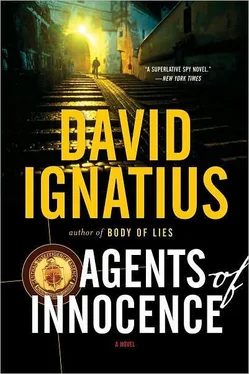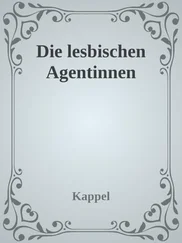David Ignatius - Agents of Innocence
Здесь есть возможность читать онлайн «David Ignatius - Agents of Innocence» весь текст электронной книги совершенно бесплатно (целиком полную версию без сокращений). В некоторых случаях можно слушать аудио, скачать через торрент в формате fb2 и присутствует краткое содержание. Жанр: Шпионский детектив, на английском языке. Описание произведения, (предисловие) а так же отзывы посетителей доступны на портале библиотеки ЛибКат.
- Название:Agents of Innocence
- Автор:
- Жанр:
- Год:неизвестен
- ISBN:нет данных
- Рейтинг книги:3 / 5. Голосов: 1
-
Избранное:Добавить в избранное
- Отзывы:
-
Ваша оценка:
- 60
- 1
- 2
- 3
- 4
- 5
Agents of Innocence: краткое содержание, описание и аннотация
Предлагаем к чтению аннотацию, описание, краткое содержание или предисловие (зависит от того, что написал сам автор книги «Agents of Innocence»). Если вы не нашли необходимую информацию о книге — напишите в комментариях, мы постараемся отыскать её.
Agents of Innocence — читать онлайн бесплатно полную книгу (весь текст) целиком
Ниже представлен текст книги, разбитый по страницам. Система сохранения места последней прочитанной страницы, позволяет с удобством читать онлайн бесплатно книгу «Agents of Innocence», без необходимости каждый раз заново искать на чём Вы остановились. Поставьте закладку, и сможете в любой момент перейти на страницу, на которой закончили чтение.
Интервал:
Закладка:
He motioned to the short man with bushy eyebrows.
“This is my deputy, Avraham Cohen,” said Porat.
“You give a nice briefing, Mr. Levi,” said Cohen.
Porat took Levi aside. He seemed even more American up close. He didn’t sweat. His hair was trim. His voice was clipped. He didn’t gesture when he talked. He seemed to Levi almost bloodless. Porat looked with his clear eyes through his clear glasses. He spoke the language of the “A” students who run the modern-day security services around the world.
“We will do something about the Ramlawi problem, I assure you,” said Porat. “But you must understand that it is delicate. It is a little awkward to learn that an American agent is directing the operations of the leading terrorist group in the world.”
36
Tel Aviv; September 1972
Levi was at his desk when the first reports began to come in from Munich. Eight Palestinian terrorists had infiltrated the Olympic Village at dawn on the morning of September 5 and were holding eleven Israeli athletes hostage.
Like the rest of Israel, Levi spent that day listening to the radio. You couldn’t escape the news. Levi had a radio in his cramped office. There was one in the cafeteria. There was even a radio in the usually noiseless stacks of the registry. It was much the same in every office building and house in Israel. People stopped what they were doing and stared at the radio, listening to the awful news from Germany.
The bulletins came every hour from Munich. There were not eleven hostages, said the radio, but nine. The terrorists had killed two of the Israeli boys when they seized the building. All the hostages would be killed, reported the radio, unless Israel released 236 Palestinian prisoners. The terrorists set a deadline of noon, then 1:00 P.M., then 5:00 P.M., then 10:00 P.M. They asked for three planes to fly them and their hostages to an Arab country. The Germans agreed. The hostages were heading to the airport.
Israel sat by the radio and listened and prayed. People went home, had dinner, lay awake in bed listening to the news. Levi stayed at the office. Just after 1:00 A.M. in Israel, the announcement came. Thanks be to God! All nine Israeli athletes had been rescued. A spokesman for the German Federal Republic announced that a rescue operation had succeeded. The Israeli prime minister, listening to the radio like everyone else, opened a bottle of Cognac to celebrate.
Israel radio continued to carry confirmation that all the hostages were safe until it went off the air at 3:00 A.M. The late editions of the Israeli newspapers bannered the glorious news. “Hostages in Munich Rescued,” said The Jerusalem Post. “All Safe After Germans Trap Arabs at Military Airport.”
Israel woke up the next morning to the horror of what had really happened. Israel Radio went back on the air at 6:00 A.M. with a somber announcement that the earlier reports had somehow been mistaken. A German effort to storm the getaway plane had backfired. All nine Israeli athletes were dead. A massacre had taken place in Munich.
Levi was as stunned as anyone else in Israel. Perhaps more so, for he had allowed himself in the few months that he had been back home to relax. He had begun to forget in those months what he had felt every day and every minute outside Israel: the feeling of vulnerability, the feeling that you could be killed at any moment by merciless enemies, the feeling that you were hated by the world-and would always be hated-simply because you were a Jew. Those feelings returned now for Levi like a ruptured wound inside his brain.
Levi took a walk that day and saw a city of red-eyed people, who had begun the day sobbing and were still stunned with grief. In the park benches along Jabotinsky Street, some old people were sitting and crying. A crowd had gathered spontaneously at the German Embassy. Levi heard the noise from several blocks away. The crowd was singing a song in Hebrew, “ Am Yisrael Hai ”-The People of Israel Live. Someone had drawn the number II on the pavement, the number of victims. Someone else had brought eleven candles. People were arriving with posters. “Never Again.” “Why No Olympic Solidarity for Jews?” “An Eye for an Eye.” An old woman was handing out black ribbons. Levi took one and put it on his arm.
What was it that had shaken the country so? Levi wondered as he walked back to the office. It wasn’t the number of people who had been killed. In the annals of terrorism against the state of Israel, eleven victims wasn’t a unique tragedy but a mere moment in a nearly continuous pattern of violence. It wasn’t the brutality of the killings, either. Dying in a hail of gunfire, after all, was not the worst way to die.
What was it, then, that made Levi and everyone he encountered that day feel so shattered by the events in Munich?
Perhaps it was the innocence and helplessness of the victims. They were athletes, symbols of the simplest and purest virtues of the nation. The strongest, the swiftest, the least tainted by the corruptions of life. They had come to Munich believing that twenty-seven years after the end of the Holocaust, Jews could come to Germany without fear. They had accepted an invitation to come and play with the other nations of the world. And it had ended with a pile of Jewish corpses.
Levi walked back to the office, sick at heart, wanting to talk to someone and also wanting to hide. The office was somber. Small groups of people talking quietly, secretaries staring blankly at their typewriters. I should do something, Levi thought. I shouldn’t sit and grieve. He went to the files and assembled a quick profile of the leaders of Black September. It was an offering to the vengeful God of Abraham and Isaac. He took it upstairs to the floor where the Chiefs had their offices. The reception desk was empty, so Levi walked down the hall until he reached the door of the deputy director, Avraham Cohen. The door was open. Cohen was sitting at his desk with his eyes closed. His head was bobbing slightly. Cohen was saying a prayer. On his arm, Levi saw, was a black armband.
Cohen raised his head eventually. His eyes were red and surrounded by dark circles.
“What do you want?” asked Cohen. The bark was gone from his voice.
“I thought this might be useful,” said Levi, handing him the file on the leaders of Black September.
“Do you know where these bastards are?”
“Some of them,” said Levi.
Cohen was silent. The bushy eyebrows, usually so animated, were at rest. Cohen was studying something on his desk, Levi noticed. It was a newspaper story listing the names of the eleven hostages-now the eleven victims-and brief biographies of each of them.
“This is the story of our people,” said Cohen.
“Yes,” said Levi. “I know.”
Cohen didn’t seem to hear him.
“Truly,” he said. “This is the story of Israel. Those boys in Munich were a map of who we are.”
“What do you mean?” asked Levi.
“Listen to me,” said Cohen, picking up the list from off his desk. “Let me tell you who these boys were. A wrestler who arrived in Israel just three months ago from the Soviet Union. Another wrestler from Russia. A riflery coach from Rumania. A weightlifter from Poland. A wrestling coach from Rumania. Can you listen to more? Eh? Do you want to hear more?”
“Yes,” said Levi.
“A weightlifter from America. A weightlifting coach from Poland. A weightlifter from Libya. A track coach from Tel Aviv. A fencing coach from Rumania. A wrestling coach from Germany, whose parents survived the Holocaust only to see their son die in Munich.”
Cohen put the list back on his desk. He put his head in his hands for a moment and then turned back to Levi.
“They are all from somewhere else, did you notice that? Eh? They came here to Israel to be safe and we let them down. You and I, the Institute. They trusted in us to keep them safe and we let them die like helpless Jews in Germany.”
Читать дальшеИнтервал:
Закладка:
Похожие книги на «Agents of Innocence»
Представляем Вашему вниманию похожие книги на «Agents of Innocence» списком для выбора. Мы отобрали схожую по названию и смыслу литературу в надежде предоставить читателям больше вариантов отыскать новые, интересные, ещё непрочитанные произведения.
Обсуждение, отзывы о книге «Agents of Innocence» и просто собственные мнения читателей. Оставьте ваши комментарии, напишите, что Вы думаете о произведении, его смысле или главных героях. Укажите что конкретно понравилось, а что нет, и почему Вы так считаете.












